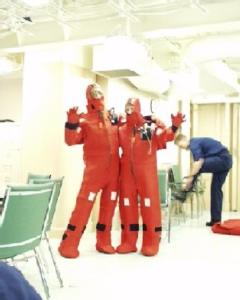26 May, 2000
And we're off!
Before getting "underway" (setting sail), all of the passengers on board the
Healy had to learn about safety on the ship. Once we leave land, we’ll
encounter extreme conditions that can be very dangerous. Staying warm in the
Arctic is easy to do on the ship, but in an emergency situation it could
make the difference between life and death. If a person fell into the icy
water, he or she could only survive for a few minutes before hypothermia set
in. "Hypo" means "below", and "thermia" refers to temperature. Can you
figure out what the word "hypothermia" means?
Unlike humans, Arctic animals are well adapted to living in this harsh
environment. Polar bears, for example, rely on their thick fur and blubber
(body fat) to keep them warm. Arctic wolves have two layers of fur, and
extra blood vessels to their feet to keep them from freezing as they run on
the cold ground. Because humans don't have these special adaptations, we
depend on clothing to keep us warm.
That's why Susan and I took a class today to learn how to put on our special
immersion suits in case of an emergency. These suits are designed to keep a
person alive when immersed in very cold water. They look like neoprene
footsy pajamas with attached gloves and a hood that covers your head and
face. Everyone calls them "Gumby suits." Just look at the picture below to
see why!
SURVIVAL I.Q. QUIZ
(adapted from the book POLAR REGIONS by Lorraine Hopping Egan)
You are getting dressed for a winter day in the Arctic. What type of
clothing would you choose?
Tight boots or loose boots?
One heavy wool coat or four layers of wool clothing?
Bright colors or white?
For the answers to these questions, and to find out more about getting ready
to set sail, click on:
Susan's page
DAILY DATA LOG (5/26/00):
Air temperature: 3 degrees C / 37 degrees F
Latitude: 48N
Longitude: 48W
Sunrise: 4:15 a.m.
Sunset: 7:56 p.m.
By comparing the latitude and longitude from yesterday and today, can you
tell which direction we’ve been traveling?
(ANSWER: Due East)

Special immersion suits known as Gumby suits keep a person dry and afloat in icy water.
Contact the TEA in the field at
.
If you cannot connect through your browser, copy the
TEA's e-mail address in the "To:" line of
your favorite e-mail package.
|
